Every business requires leads: people who fit the demographic, psychographic, and behavioral qualities of the company’s ideal customer and show interest in purchasing its product or service. Once a company has leads, it can nurture them through various marketing and sales activities with the hope that they’ll eventually make a purchase.
In order for the nurturing process to succeed, organizations have to better understand their leads and what they want — which is where lead generation surveys come in. In this article, we’ll define lead generation, explain how to use lead generation surveys effectively, and share some examples of useful lead generation questions. Plus, we’ll show you how to create a lead generation survey with Jotform.
What is lead generation, and what are lead generation surveys?
Lead generation is the process of turning a prospect into a lead and acquiring their contact information.
Business-to-business (B2B) industries often generate leads by offering prospects access to useful content in return for their contact information. Business-to-consumer (B2C) industries sometimes take this approach as well. For example, a company may offer a white paper or e-book that contains specific information the prospect is looking for in return for the prospect’s name, phone number, and email address.
Organizations use lead generation surveys to learn more about prospects, such as
- The challenges they face
- What kinds of solutions they need
- What they value most
- How much importance they place on price
Sometimes lead generation surveys are part of the initial lead capture, meaning an organization uses them at the same time it collects contact information in exchange for the free content. Other times, they use lead generation surveys after the initial lead capture.
“The profit is in pain,” says Harrison Tanner Baron, CEO and founder of Growth Generators, a digital marketing agency. “Doing a survey geared toward your ideal customer can help expose pain points they have, and you can leverage that to be the solution to their problems. They will be your most eager buyers and your biggest evangelists if you solve their problems.”
Why are lead generation surveys important in business?
The key advantage to using lead generation surveys is that you gain more insight into your target audience. Once you have a deeper understanding of your prospects, you can offer them more relevant content to capture more leads and nurture them more effectively according to what they value and need.
Another reason to use lead generation surveys is to help you segment leads into smaller categories. This is particularly important for organizations that sell different types of products and services that solve a number of challenges. By segmenting your leads, your company can offer prospects more relevant content that appeals to their specific needs, as opposed to general content that may not interest them as much.
Lead generation surveys can also help you identify which of your leads are most qualified and ready to convert into customers. This way, you know where to focus your time and energy during the nurturing process. If the lead generation survey shows that some leads are more interested than others, you may decide to prioritize those.
What are some best practices for creating lead generation surveys?
If done right, lead generation surveys can help organizations capture valuable information about a target audience. Follow these best practices when creating your lead generation survey:
- Keep it short. Asking too many questions will backfire. Most prospects don’t want to give away too much information, nor do they want to spend a long time filling out a survey. Only ask questions that are critical to the lead generation process.
- Stay focused. Consider what you already know about your target audience and what information you’re missing. Don’t ask questions that are tangential or irrelevant to your business or to the problem the prospect is facing right now.
- Be problem-oriented. Baron notes that effective lead generation questions point people to see where they have challenges or where they’re struggling. Then, you can offer your products or services as a solution.
- Be thankful. Your target audience doesn’t owe you any information, so it’s important to show gratitude when they do. Be transparent about why you’re asking these questions, and let them know their answers are valuable to your business.
- Use skip logic. Not all questions you want to ask will be relevant for all participants. Use conditional branching or skip logic to design surveys that branch off at specific questions to ask each respondent the questions that are most relevant to them.
- Provide an incentive. If you’re having a hard time getting people to fill out the lead generation survey, consider sweetening the pot. Offer a discount, a gift card, or additional content in return for their time and responses.
- Offer a meeting. Depending on your business, it may be effective to offer a next step as part of the lead generation form. Baron recommends pairing lead generation forms with a meeting request. Leads will have their problems top of mind and will see the company as the answer to their solutions.
- Try multiple channels. Reach your target audience through multiple paths, such as social media, website, email, and phone. This way, you have a better chance of connecting, which hopefully translates into greater participation rates.
Examples of lead generation survey questions
To get started building your own lead generation survey, check out this list of sample questions, broken down into categories.
Contact information survey questions
In some cases, organizations may already have this type of information before sending the lead generation survey through previous outreach efforts; in other cases, they may not. These questions are important because they enable the organization to reach back out to the lead to nurture them in the future.
- What is your name?
- What is your phone number?
- What is your email address?
- What organization do you work for?
- What is your preferred method of communication?
Demographic questions
Demographic questions help businesses further categorize their leads and match them with the needs, values, and challenges of their target groups.
- What is your age range?
- What is your gender?
- Where do you live?
- What is your occupation?
- What is your annual household income?
Role-based questions
This section is particularly important in the B2B industry, as it can help organizations figure out whether the prospect is the decision-maker at the company.
- What is your role?
- Are you in charge of your department budget?
- How do you stay on top of industry trends?
- What are your main challenges at work?
- Does your organization currently have a solution for these challenges?
Needs-based questions
Organizations should ask these questions to get a deeper understanding of the kinds of challenges their prospects face on a daily basis.
- What are your top three challenges?
- What frustrates you the most about these challenges?
- What kinds of solutions have you tried before?
- Why were they unsuccessful at solving your problem?
- If you could design a custom solution, what would it look like?
Behavioral questions
Questions like the ones below may provide insight on how prospects make purchasing decisions.
- How likely are you to make a purchase in the next three months?
- Do you feel loyalty toward a specific company in the industry? Why?
- Are you more motivated by cost, speed, or quality?
- How likely are you to make a repeat purchase?
- How likely are you to refer this company to a friend?
How to create lead generation survey questions with Jotform
Now that you know all about the importance of lead generation surveys and how to use them effectively in your organization, it’s time to start creating and using them. “All questions are fair game,” says Baron. “Just make sure you stay on topics your company can help resolve.”
Jotform offers lead generation survey templates that are fully customizable, from the content and layout to the logos, so you can easily create surveys that will meet your needs. Not only that, Jotform integrates with many customer relationship management (CRM) tools, so you can streamline your lead generation workflows with ease.
Photo by Lynn Van den Broeck on Unsplash


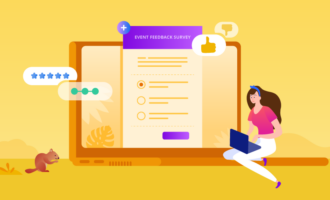












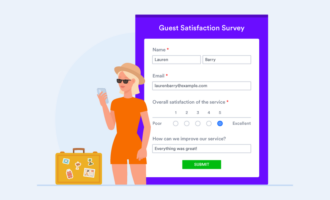




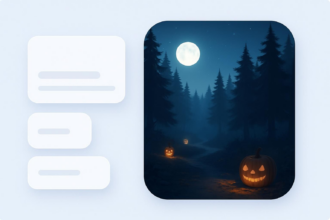














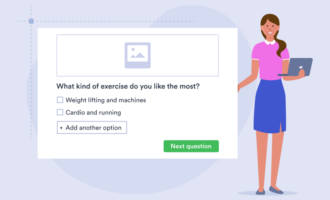




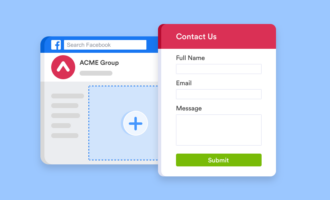

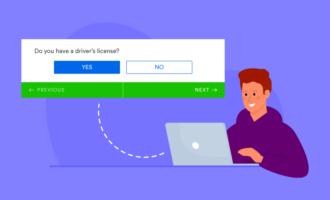
































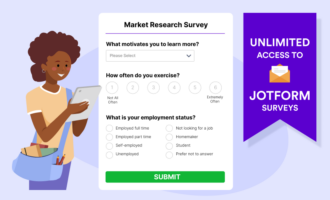





















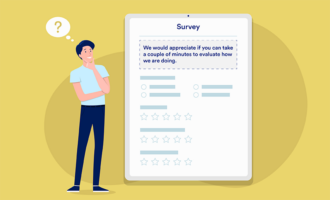


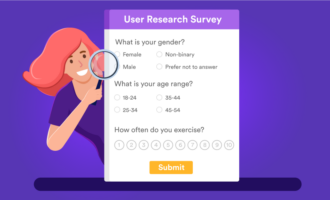

Send Comment: